This month more than 20 LGBT+ organisations including Stonewall, and the Good Law Project, requested the United Nations review evidence that demonstrates how the UK’s Equalities and Human Right’s Commission (the EHRC) is no longer operating independently of the UK government, therefore is no longer fit for purpose. They asked that the EHRC be stripped of its ‘A rating, which allows it to participate in the UN Human Rights Council.
Shortly afterwards, the Chair of the EHRC, Baroness Kishwer Falkner had an article published in the Guardian Newspaper, claiming The EHRC is here to support the rights of all – whatever anyone says to the contrary, despite the evidence submitted to the UN. This was followed by a letter from Elaine Willis (Chair of Stonewall, early 1990s). Willis argues that Stonewall’s proper role is to support the EHRC in the difficult task of ‘balancing rights’ and goes on to say that Rights and Freedoms are not entitlements; they are negotiated with others before the law through honest and often impassioned debate.
Willis’s claim demonstrates her lack of legal knowledge and her inadequate grasp of what a Right is.
There are Civil Rights we earn through our citizenship and fiscal contributions to the state. We do not earn our Human Rights; we acquire them by being born and they are immutable whilst we exist. Willis should understand that. During her time as Chair, Stonewall, an LGB organisation that excluded trans people, was supporting cases going to the European Court of Human Rights (ECtHR) challenging the government’s dishonourable discharges of Gay and Lesbian people from the military, usually for merely having suspicious desires; sexual activity never needed to be proved before dismissal.
Over time, I have discovered the UK government is a reticent beast, its preferred choice is not to respond to any new societal understandings of what our rights are. If they respond it will only be when ordered to by an International Court. If Willis’s understanding was true and our Human Rights had to be ‘negotiated’ before the law in the British Courts or debated by Parliament, lesbians and gay men serving in our military would still be being dismissed.
In 1992, when Stonewall was fighting the Military cases, Press For Change (PFC) was formed as a grassroots community movement co-working to provide the UK’s trans community with skills, information and legal knowledge to raise their voices in protest at the legal de-humanisation we faced, and our apparent legal exclusion from any Rights. In 1992, PFC made a commitment – that entered our rule book –that we would never to do anything which would remove the rights of others as we fought for our rights. We also committed to work by making friends and not by making enemies.
I will give two practical examples of how as trans activists we have stood by our principle of protecting and promoting the rights of all.
In 1997 PFC supported the case of X, Y & Z v UK [1997] ECHR before the European Court of Human Rights. X (a trans man) and his partner Y (a cis woman) brought the case on behalf of their child Z. The case concerned how all queer families were unrecognised by UK law. Cis men automatically became the legal father when their cis partners became pregnant by donor insemination at a licensed clinic even if they were never registered on the birth certificate. The fertility clinic system required all accompanying male partners, including X, to sign and agree to be the father and thus financially liable for any child conceived. After signing, X requested permission from the responsible Minister, Virginia Bottomley MP, to be allowed to register as Z’s parent. The request was turned down.
In the court application, X & Y argued that the lack of two parents on Z’s birth certificate contravened her future right to privacy, and the solution was for X, a trans man, to be registered as a parent of Z alongside Y. They did not ask for X to be named as a man nor as a father. That wording would mean that if the case had been won, all queer people who had become joint carers of children in this way could be registered as legal parents.
The circumstances in which this case was brought mattered. X had no legal relationship with Z. Without recognition of X as a parent, if Z’s mother Y had died, legally Z would become a homeless orphan. Family Social Services would have been obliged to step in, and remove Z from her home, and place her in foster care whilst they assessed whether X was an appropriate adult to raise Z. In the early 1990s, when trans people were still viewed with suspicion and referred to as perverts in much of the press, there was no guarantee that Social Services would find X to be fit to parent Z. It was the nightmare scenario that I, as X, lived in dread of. I could not imagine failing Z more, if their mum died.
The case lost, but the Court of Human Rights declared in an aside to its judgment that as X & Y lived together in a joint home, as loving partners, raising 4 small z’s by the time of the hearing, that we were patently a family. That recognition of our family status was to provide a building block for a series of lesbian and gay family cases brought before the EU’s Court of Justice as well as the ECtHR in the 10 years that followed.
Eight years later, in Goodwin & I v UK [2002] the Court of Human Rights held that trans people had a Human Right to their personal autonomy and their development, to privacy including of our medical history, and a right to marry in our affirmed gender. The UK Government were forced to provide these Rights and so the Gender Recognition Act came into being, When it was being finalised, Claire McNab and myself (along with Christine Burns and Angela Clayton) were PFC’s trans community stakeholder reps to the Department of Constitutional Affairs (DCA) who managed the Bill’s passage through parliament.
There was a problem though, legislators & the DCA had a knowledge gap as to the real lives of trans people. ‘No 10’ had made it quite clear, the Act was not to create same-sex marriages, that would be a step too far. That would mean married couples being required to divorce before one partner could obtain gender recognition.
This was going to cause a problem for the married ‘late’ transitioners. Most but not all were trans women.
Many had spent their working lives following a well-recognised pathway that George Brown MD, a researcher with the American Veteran Medical Service, termed ‘the flight into hypermasculinity’. As teenagers, they had taken to portraying themselves as tough ‘real men’ when in school and public spaces. It was a way of hiding their desire to be a woman and avoiding the bullies. At school, they captained the rugby team, then joined the forces and captained a troop or a ship, before in their 40s returning to civvy street where they became ‘captains of industry’. These trans women usually married and raised families. Their long exemplary careers in extremely dangerous jobs had required frequent moves including overseas postings, which meant their wives had very limited career opportunities. They became good ‘service wives’, raising the children and engaging in local voluntary activities.
The deal was that when their husband died, as widows they would receive survival pension benefits. That would often be their only pension entitlement. In 2004 it was still the case that survival benefits, particularly from the armed and emergency service pensions, were dependent upon marriage. Once divorced, the survivor benefits vanished.
The Gender Recognition Act would present a major difficulty for these couples. For the trans partner to take advantage of their Human Right to legal gender recognition the couple would have to divorce. That would mean their spouse losing their only pension – the survival pension benefits. The trans partners all were unequivocal in saying that would be a betrayal of the person who had stuck by them through the worst that could have been thrown at a marriage. The alternative was for them to stay married to protect those benefits but then the wives were arguing that they could not possibly strip that hard fought for piece of dignity from the person they loved. The Minister responsible for the Act, Labour peer Geoffrey Filkin, and the DCA civil servants we worked with expressed considerable sympathy for these couples but felt unable to defy No 10’s red lines.
Floating in the ether was the idea that the UK would eventually follow France in creating a Civil Partner status, equivalent to marriage, for same-sex couples. In PFC we saw that as an opportunity to kill two birds with one stone. Claire McNab and I spent two days running across London between the offices of Stonewall and the DCA engaging both with our idea. By collaborating with the people in Stonewall and those in the DCA, an agreement was reached. A Civil Partnership Act 2004 would come into force exactly 6 months after the Gender Recognition Act 2004. The couples whose interests we were supporting, could then with some pre-planning attend the High Court, obtain their divorce and a Judge would then hand the trans partner their new birth certificates.
Along with family and friends, the couple could then walk down the road to the Registrar’s where they would be registered as Civil Partners. With all that happening on the same day, the pension companies agreed to maintain the pension rights. Furthermore, finally all same-sex couples could then choose to access the benefits that had previously only existed in marriage.
As things turned out, we were not to be welcomed into Stonewall, the organisation, for another decade. Our inclusion in Stonewall has worked, and for most LGBT+ people it is now understood that we are all in this together.
But we also acquired enemies.
As Stonewall became trans-inclusive, we started to see hostile articles in the media, the Government received demands to enhance women’s rights, and legal actions began to enter the courts. Anti-trans’ers were repeatedly attempting to remove Human Rights like the right to privacy or to have legal gender recognition from trans people.
Shocked to see feminist academics & journalists I hugely respected, including some as friends, involved in organising events where they claimed my community was a threat to them, initially, I could not compute what I was seeing. When bringing in the Gender Recognition Act in the early 2000s, opposition had come from Christians: one Sunday the Roman Catholics had a ‘post -mass’ signing of a petition, and organisations like the Christian Institute spent lots of money creating false news ‘information’ leaflets referring to us with pronouns from our birth sex.
But in 2004, third-wave feminists were very supportive of the legal changes, as were LGB folk who had always been natural allies. Like us, they had been fighting for the same things: employment rights, personal safety and relationship recognition.
In 2017, the Prime Minister Theresa May announced proposals to modernise the Gender Recognition Act. Then the floodgates opened, and vicious vitriol poured through them. Ever since I have felt the trans community is like a group of unarmed Boy Scouts and Girl Guides defending a tiny plot of freedom by respectfully suggesting to those approaching on their tanks to ‘please go home’.
When the LGB (Lesbian, Gay and Bisexual) Alliance appeared on the scene as major players in the anti-trans movement it was as if the cubs and brownies had been sleeper cells who, now armed to the teeth had now come out fighting – against us! The fifth columnists who turned on us in ‘our’ own home.
The anti-trans movement continues to morph, and it now focuses on ideas ‘sex-based rights’ for women claiming trans rights endanger women’s rights. They continue to have broad unquestioning support from much of the British media on the right, and they have raised over a £million and brought nearly 20 anti-trans legal cases before the UK courts. Their methods include recruiting previously apolitical (and possibly naïve) women saying they will lose the protections they have as women, to their cause.
We are now seeing this movement spread its’ wings across North America, Europe, and into Africa. A second element has arisen more recently, Lesbian women and gay men opposing trans rights, but from a distinct perspective. Well organised, their claims include young lesbians being turned into trans men, that trans women are coercing lesbian women into unwanted sexual activity, and that ‘affirming a child as “trans”, when they might otherwise grow up to be lesbian, gay or bisexual, is a form of conversion therapy”. Both anti-trans feminists and anti-trans LGB folk claim biology trumps gender identity.
In the 1990s, the UK’s trans community, especially those of us who were activists, recognised our battles were part of the much larger war of liberation politics and claims to equal rights that has been going on for more than 250 years. It is a war that has been long fought by marginalised groups. We should perhaps start with those born on the wrong continent meaning they could be valued by white saviour Christian imperialist capitalists as chattels rather than people. It is those who have the wrong colour skin, those born on the wrong side of the tracks into crushing poverty, those whose ‘worthless’ bodies are so ‘wrong’ they make ‘normal’ people uncomfortable, and those like me with the wrong body for the person I am. And amongst the fighters, have been those people who fall in love with the wrong people. I found myself challenged by the gay men and lesbian women now pursuing an anti-trans agenda?
I found myself asking “what do they think they will get out of this?” And then it all clicked into place.
I’ve the evidence that points to anti-trans women’s groups having taken funding from the Christian right. I cannot confirm the same is happening for anti-trans LGB groups but even if the money isn’t flowing, these lesbians and gay men are being used. They are substitutes for that branch of Christianity and Christians who think they are RIGHT.
They never went away; they just went into hiding for ten years after the Gender Recognition Act was passed. Having been waiting, having learnt the lessons of their resounding defeat when the Gender Recognition Act came into force, they are plotting again.
To anyone who is anti-trans, then if you are a right wing Christian Evangelical, fair enough, but be brave, step up and own what you are doing.
I do not believe most anti-trans lesbians or gay men are Christian Evangelicals. I think the right-wing Christian Evangelical movement is a complete anathema to them. Most LGB people are aware that the Christians were the major historical persecutors of LGB people. So to those gay men or lesbians now campaigning against us then I ask this:
Why are you fighting as proxies for them? Can’t you see; you are sitting on shaky, short-lived paper thrones, sponsored by the far-right?
Their ‘Christian’ agendas are reactionary, pale-skinned, nationalist, imperialist, patriarchal, & heteronormative. I can assure you, they are as anti-lesbian and gay as they are anti-trans. We daily see the evidence of their destruction of the rights of Lesbian and Gay people (as well as trans people) in Russia, Latin America, Africa, and the USA.
I do not believe any lesbian or gay men will gain by damaging trans people’s rights. Why not? Because I can promise them that the anti-sex/anti-gender/anti-liberal project of the Christian right will not stop at me. The next attacks will be coming after you and your Human Rights.
LGB people opposing trans rights are pawns in a game they clearly cannot yet comprehend.
Look at the big picture, you are being used by a well organised reactionary force determined to destroy the gains made by trans people. Win and you will pave the way for them to say “trans people shouldn’t really exist”. The next thing you will discover is that in their world, you don’t exist either.
Surprisingly, for the chair of the Equalities and Human Rights Commission Baroness Falkner thinks that whatever a balancing of interests, it is not trans-inclusive.
And whatever Elaine Willis might incorrectly think, trans people, do not have to negotiate for our immutable Human Rights with anyone.
© Stephen Whittle, 28 February 2022.





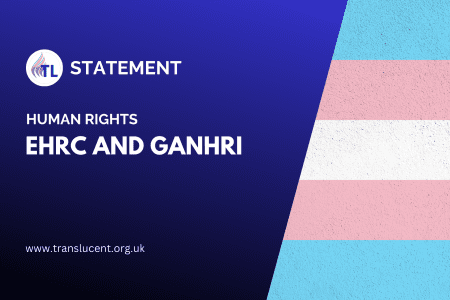
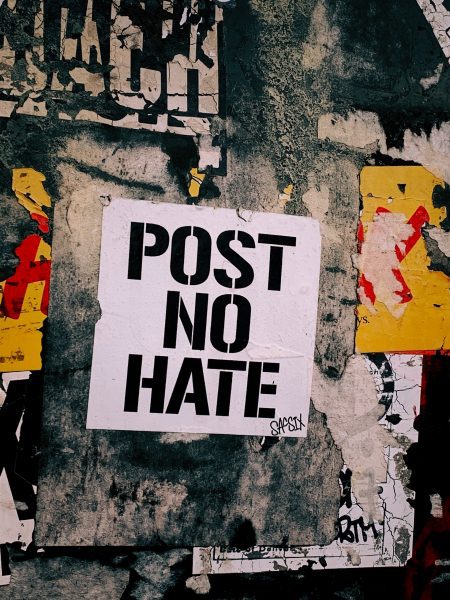
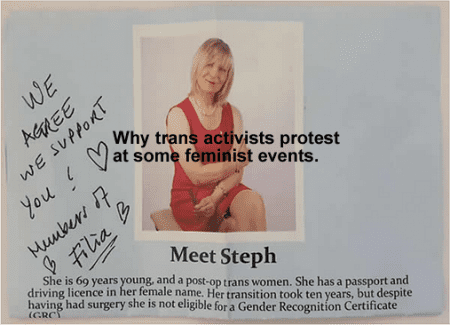
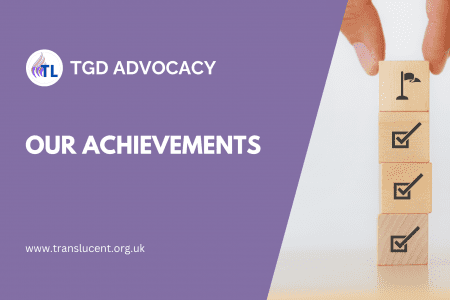
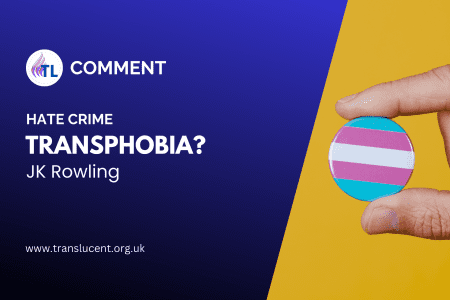

 To provide the best experiences, we use technologies like cookies to store and/or access device information. Consenting to these technologies will allow us to process data such as browsing behaviour or unique IDs on this site. Not consenting or withdrawing consent, may adversely affect certain features and functions.
To provide the best experiences, we use technologies like cookies to store and/or access device information. Consenting to these technologies will allow us to process data such as browsing behaviour or unique IDs on this site. Not consenting or withdrawing consent, may adversely affect certain features and functions.